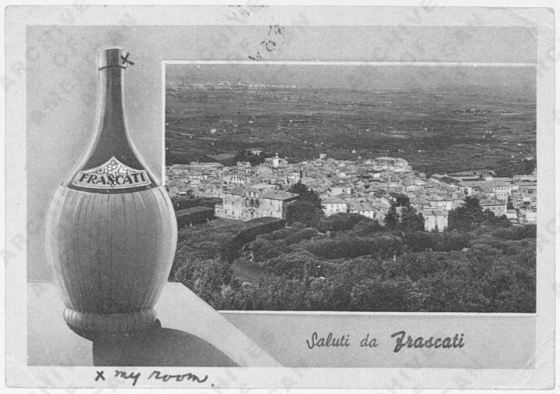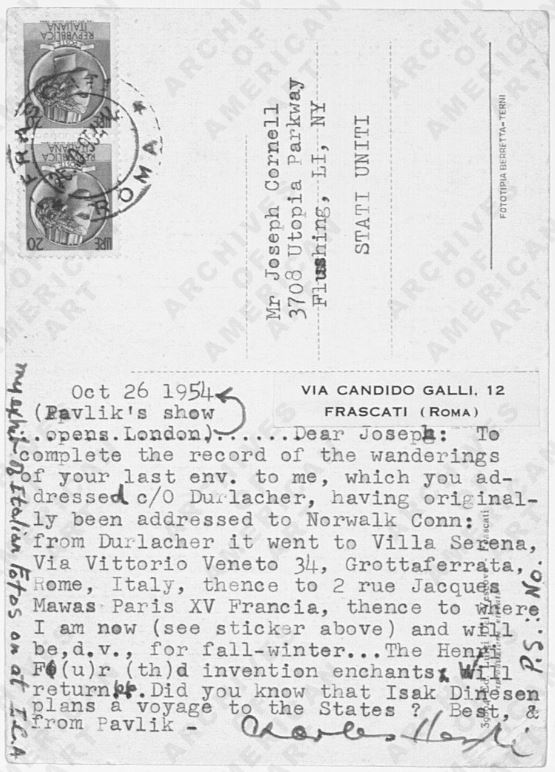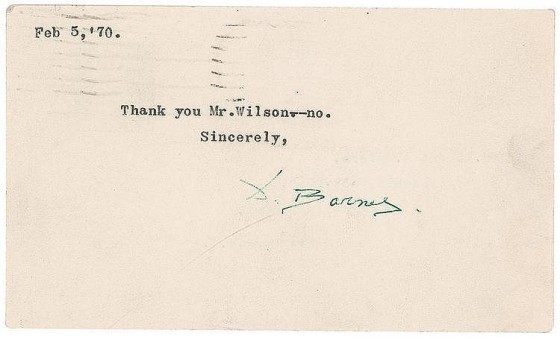Over the last few days I’ve spent some time digging into the wonderfully expansive online holdings of the Joseph Cornell Papers maintained by the Smithsonian’s Archives of American Art website. Cornell sustained a lively correspondence with Ford, Parker Tyler, and a number of individuals pertinent to this site, and as the intricate networks formed by the queer modernists is a topic of particular interest to me, I plan to start featuring these visual traces and mementos that offer small, illuminating glimpses into various social connections.
To start off, this lively (and very legible–not always a given!) postcard from Ford to Cornell sent in 1954. Ford’s humorous indication of his “room” in the Italian town of Frascati certainly is in line with his sly, wicked sense of humor:


Deborah Solomon reports in her biography of Cornell that Ford and Cornell “began corresponding in 1939, after Ford wrote to Cornell to propose that they collaborate on a volume of poems and collages.” Cornell was apparently flattered by the suggestion, but “saw little possibility of an artistic partnership” demurring to Ford in a letter due to his “total lack of interest in psychoanalysis and the current preoccupation with sex.” But even if a full collaborative effort never came to fruition, Cornell’s nonetheless provide Ford a whimsical cover for his poetry collection ABC‘s, published in 1940.
The reference to author Isak Dinesen (pen name of Karen Blixen) in this note is an interesting one, as Solomon’s records that “when Ford gave [Cornell] a copy of Isak Dinesen’s Seven Gothic Tales, he inscribed the book: ‘Joseph, these were written for you.'”
Ford’s indispensable published journal Water from a Bucket indicates that he and Tchelitchew (Pavlik)’s time in Frascati stretched into early 1956. I particularly like this uncharacteristically fanciful musing–the sole entry for November of 1954:
I took a terrace walk and saw the most brilliant falling star–I always make the same wish: Love.
A sentiment that seems, quite honestly, much more in line with Cornell’s romantic sensibility than Ford’s bawdier, unsentimental impulses.
Provenance:
General Correspondence: Ford, Charles Henri, 1939-1970
Joseph Cornell Papers, 1804-1986
Archives of American Art, Smithsonian Institution
Works Cited
Ford, Charles Henri. Water from a Bucket: A Diary, 1948-1957. New York City: Turtlepoint, 2001.
Solomon, Deborah. Utopia Parkway: The Life and Work of Joseph Cornell. New York: Farrar, Straus and Giroux, 1997.


